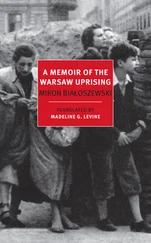On those occasions when I demanded absolute quiet, he’d sit dutifully on our bed and do his beloved mathematics calculations, seeking silent comfort in his own love of precision and detail. I can see now that he tried to tiptoe through those first weeks with me. Maybe he had faith that I would eventually hear what he couldn’t say.
On Saturday, 12 October, the inevitable came, and the Nazis ordered all Warsaw Jews inside the ghetto. The caravan of despair along Franciszka ska Street started at dawn. In the late afternoon, while I was watching from the window in Stefa’s room, a Gestapo officer ordered a group of bearded Orthodox grandfathers to remove their prayer shawls and clothes, and do squat thrusts on the street.
‘Bastards!’ my niece mumbled to herself, but just a few minutes later she assured me we were better off this way.
‘You must be joking!’ I told her.
‘Not at all!’ she declared. ‘Now we know we can depend on no one but ourselves.’
Heroic words they were, but I could see nothing positive in the panting desperation of those naked old men, much less in my humiliation for not running out to defend them.
Our spirits began to flag badly, so to cheer us up, Stefa invited some new friends of hers over for Sabbath dinner on 25 October: Ewa Gradman, a shy young widow who worked at the bakery in our courtyard; Ewa’s seven-year-old daughter, Helena, a watchful little girl whose diabetes had left her with the gaunt cheeks and light-filled eyes of a saint in a Russian icon; and Ziv Levi, a saturnine, pimply seventeen-year-old orphan from Łodz´ whom Ewa and Stefa had adopted as their pet project. He had just begun an apprenticeship at the bakery and had moved his cot into one of the storerooms.
Ewa baked a sweet-smelling kugelhopf for our party, and Ziv brought along four fresh eggs and a single red rose. The young man presented his gifts to Stefa with such chivalrous formality that Adam started to giggle and I had to chase him out of the room.
As always, our building manager Professor Engal, rapped three times on our door at sundown to indicate the start of the Sabbath.
After our banquet of carp and kasha, Stefa dug a straw hat out of her wardrobe, tilted it at a jaunty angle on her son’s head, and whispered in his ear. He grimaced and squeezed out a hesitant No , but she replied For me, baby in a pleading tone, sat down at her piano and eased into the sugary opening bars of Maurice Chevalier’s ‘Valentine’.
Cowed by his mother’s insistent glare, Adam began to sing. Unfortunately, he was too nervous to find his true voice, which was unstudied but beautiful.
The boy loved music but was terrified of performing; he only felt comfortable revealing his inner life – and his gifts – to those he loved. Stefa sometimes forgot that he wasn’t a secret cabaret star like her.
I saw in my nephew’s eyes that he was barely treading water, so, after the first verse, I jumped up and shushed him with whirling hands. ‘ Piskorz , it’s way past your bedtime,’ I told him, adding to our guests that we ought to call it a night.
Stefa, furious, looked back and forth between her wristwatch and me. Faking a laugh, she said, ‘But you can’t be serious – it’s only nine!’
‘The boy needs his sleep,’ I told her. ‘And in point of fact, so do I.’
Adam looked at me with a face compressed by fear, his straw hat in his hands.
Stefa jumped up, glaring. ‘If you don’t mind, Uncle Erik, I’ll make the rules in my own home! Especially when it comes to my son.’
‘Very well, make all the rules you want – but without me!’ I snapped back, and I took a first step towards the coat rack, intending to walk off my anger, but Adam burst into tears and bolted into his mother’s room.
I rushed to him, but when I caressed his cheek he turned away from me. I assured him that I didn’t want an angel for a nephew. ‘Especially since I’m an atheist, and I have no intention of going to heaven,’ I joked.
Pity an old man with little experience of children; my attempt at levity only made him cry harder. While I was apologizing to him, Stefa appeared in the doorway, her hands on her hips. ‘Now you’ve done it!’ she began. ‘As if the boy didn’t have-’
‘He shouldn’t have to sing for me or anyone else!’ I cut in. ‘You know he doesn’t like it.’ Hoping to ease the tension between us with a little humour, I added, ‘Besides, I think we can do without him singing chansons d’amour in Yiddish-accented French, at least till we get a bit more desperate for entertainment.’
‘All you do is bully him!’ Stefa yelled vengefully. ‘You scare him half to death!’
She was right, of course. ‘All that ends now,’ I told her, and I surprised myself by adding, ‘I’m through punishing him.’
Tears welled in my niece’s eyes.
‘I’m sorry I’ve been difficult, Katshkele ,’ I told her, using the pet name everyone in the family had for her.
She nodded her acceptance of my apology, unable to speak. I took Adam in my arms and kissed his brow. Stefa eased the door closed on the way out.
Adam and I talked together in whispers, since it made our friendship more intimate. I dried his eyes and spoke to him of the journeys I’d take him on when we got out of the ghetto. New York was the city that crowned his dreams, and he stood on his toes when we talked of riding up to the top of the Empire State Building, showing me how he’d look out across the widest horizon in the world.
Lying with my arm around Adam that night, I saw that my father had been haunting my mind to remind me I was failing his great-grandson. And myself, of course.
I’d come to the ghetto planning to read all of Freud one more time, and eager to write up several case studies, but within two months I’d given all that up. It was strangely easy. As if all I had to do was hop on a tram headed into the countryside instead of the city centre.
One minute, a man can think of nothing but leaving behind seminal works that will be read in London and Vienna for decades, the next he is waiting outside a soot-covered grammar school for his nephew, examining a ripped seam on one of his two pairs of trousers and wondering if he still knows how to use a needle and thread.
Now that Adam and I were friends again, he’d tell me about his day as we walked home from school. He’d start in a cautious monotone, testing my interest, but each of my questions would encourage him to pick up his rhythm, so that his account would soon be zooming downhill at top speed. Sometimes he’d launch himself across a bridge of thought where I didn’t know how to follow. His words would whizz past me like honeybees.
To have a buzzing little nephew telling me stories that I didn’t have to understand or interpret was to be in a state of grace.
Adam and I soon got into the habit of visiting Izzy after school and having lunch with him. My old friend had had his elegant clock shop in New Town closed by the Nazis and was repairing watches in a dank, dungeon-like workshop at the front of a stationery warehouse on Zamenhof Street. What Adam loved most about our afternoons there was watching Izzy perform lengthy surgery on a watch or clock. The boy would kneel on his chair and lean across the worktable, his chin propped on his fists, entranced by how his uncle-by-affection could tweezer even the most microscopic gears, cogs and springs into place. And bring what was dead to life.
In a way, Izzy became the wizard in the story of Adam’s life inside the ghetto. Just as Ziv was soon to become the awkward genius…
One Saturday evening in early November, the baker’s apprentice stopped by with an alabaster chessboard under his arm and challenged me to a game. As if he was a schoolboy unable to dress without his mother’s help, the tail of his white shirt was sticking out and one of his shoelaces was undone. His stiff ginger hair fell sloppily over his ears.
Читать дальше












